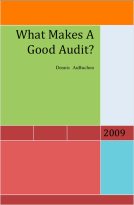| ||||||||||||
| Category: Self Help |
(requires Adobe Reader)
|
| About the Book | |
|
This book presents and discusses the principles and characteristics of good auditing from the viewpoint of the auditor and those being audited. The book provides discussion of the various types of audits including those we personally perform. Through the discussion of the various types and the requirements associated with them this book provides an opportunity to better understand the audit process from both sides. The organizational structure of this topic in this book takes the reader from the decision point to audit, the responsibility for auditing and how an audit should be conducted. The key element in the audit process is discussed in the decision to audit process and what must be in place before an audit can be conducted both internally and externally. This book covers not only the commercial auditing process but those in place for government audits performed by the government or for the government by a third party. Surprisingly the government audit requirements and responsibilities and the commercial ones in place are not much different and this books explains the connection. This book also provides a chapter on team leader responsibilities, auditor qualifications and the use of experts where they are needed to supplement unique auditing requirements. These conditions and/or requirements must be addressed before an audit can be performed and the discussion of these principles helps the reader understand the responsibilities of each of these elements. Another unique aspect of this book involves the establishment of an Auditor Code of Ethics which is an important aspect of any audit to be conducted. The manner in which an auditor accomplishes his/her responsibilities makes a statement about the character of the work being performed. Two other unique requirements involve the benefits of auditing for auditors and the benefits of auditing for auditees (those being audited). These elements help to establish the benefits of audits from both perspectives and provide a better understanding of the overall audit process. The discussion of the commonality and differences between commercial auditing practices/requirements and the government helps to tie together how much both avenues of auditing are really not different at all. The difference mainly lies in the terms used in both areas in performing audits for their respective needs. Audits are needed in both areas to help assure that the needed requirements are being completed whether it involves commercial entities or government entities/requirements does not make a difference. We as consumers want products and services to perform as intended and designed. Auditing is a means to that end when they are performed to the level required to validate the requirements are accomplished. The book also discusses the aspect of personal audits and how we as individuals perform audits all the time. The examples presented and discussed bring the process of audits and the need for them down to the individual level. Most individuals do not necessarily make the connection between the things we do as individuals and the audit process. The chapter on personal audits helps make this connection.
|
|
| Related Title | |
|
|
| About the Author | |
 |
Dennis has over 20 years experience in the quality assurance field and part of that involved the performance of audits for which he is certified through the American Society for Quality. He has been an audit team leader and team member. His experiences provide the background for this book. |

